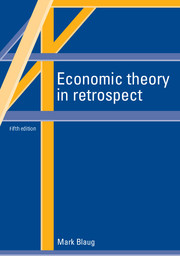Book contents
- Frontmatter
- Dedication
- Contents
- Preface to fifth edition
- Acknowledgements
- Glossary of mathematical symbols
- Abbreviations
- INTRODUCTION HAS ECONOMIC THEORY PROGRESSED?
- 1 PRE-ADAMITE ECONOMICS
- 2 ADAM SMITH
- 3 POPULATION, DIMINISHING RETURNS AND RENT
- 4 RICARDO'S SYSTEM
- 5 SAY'S LAW AND CLASSICAL MONETARY THEORY
- 6 JOHN STUART MILL
- 7 MARXIAN ECONOMICS
- 8 THE MARGINAL REVOLUTION
- 9 MARSHALLIAN ECONOMICS: UTILITY AND DEMAND
- 10 MARSHALLIAN ECONOMICS: COST AND SUPPLY
- 11 MARGINAL PRODUCTIVITY AND FACTOR PRICES
- 12 THE AUSTRIAN THEORY OF CAPITAL AND INTEREST
- 13 GENERAL EQUILIBRIUM AND WELFARE ECONOMICS
- 14 SPATIAL ECONOMICS AND THE CLASSICAL THEORY OF LOCATION
- 15 THE NEO-CLASSICAL THEORY OF MONEY, INTEREST AND PRICES
- 16 MACROECONOMICS
- 17 A METHODOLOGICAL POSTSCRIPT
- Index of names
- Index of subjects
Preface to fifth edition
Published online by Cambridge University Press: 12 September 2018
- Frontmatter
- Dedication
- Contents
- Preface to fifth edition
- Acknowledgements
- Glossary of mathematical symbols
- Abbreviations
- INTRODUCTION HAS ECONOMIC THEORY PROGRESSED?
- 1 PRE-ADAMITE ECONOMICS
- 2 ADAM SMITH
- 3 POPULATION, DIMINISHING RETURNS AND RENT
- 4 RICARDO'S SYSTEM
- 5 SAY'S LAW AND CLASSICAL MONETARY THEORY
- 6 JOHN STUART MILL
- 7 MARXIAN ECONOMICS
- 8 THE MARGINAL REVOLUTION
- 9 MARSHALLIAN ECONOMICS: UTILITY AND DEMAND
- 10 MARSHALLIAN ECONOMICS: COST AND SUPPLY
- 11 MARGINAL PRODUCTIVITY AND FACTOR PRICES
- 12 THE AUSTRIAN THEORY OF CAPITAL AND INTEREST
- 13 GENERAL EQUILIBRIUM AND WELFARE ECONOMICS
- 14 SPATIAL ECONOMICS AND THE CLASSICAL THEORY OF LOCATION
- 15 THE NEO-CLASSICAL THEORY OF MONEY, INTEREST AND PRICES
- 16 MACROECONOMICS
- 17 A METHODOLOGICAL POSTSCRIPT
- Index of names
- Index of subjects
Summary
Fifth edition
This is the fifth edition of a book that has been out now for more than thirty years. Why on earth should there be a new edition of a history of economic thought? Surely, the history of economic thought is not a subject like macroeconomics or industrial organisation in which the growth of new knowledge necessarily requires the periodic updating of textbooks? Surely, the interpretations of the great thinkers of the past have long ago been set in concrete?
To ask such a question is to suggest that the history of economic thought is mere antiquarianism, so that only the discovery of forgotten manuscripts or the re-examination of previously neglected works could possibly add anything new to the corpus of received interpretations. But, on the contrary, every new development in almost every branch of modern economics is liable to make us think again about some old familiar text in the history of economics or to revise the standard version of what the great thinkers of the past really meant to say.
The collapse of communism in Eastern Europe makes us read Marx afresh and casts a new light on the socialist calculation debate of the 1930s. The emergence of public choice economics in the 1960s reminds us of how much of the economics of politics in Adam Smith's Wealth of Nations was ignored by his immediate followers. Similarly, the emphasis on entrepreneurship and process-competition in modern Austrian economics brings home to us the price that modern economics has paid for its obsessive preoccupation with static equilibrium theory. In a hundred different ways, the history of economics reacts to, but also acts on, every new current of thinking in modern economics. In short, this (or any other) edition will never contain the last word on the meaning and significance of past economic ideas.
The first edition of this book started with a statement of two diametrically opposed points of view to the study of the history of economic thought – relativism and absolutism – and held out programmatically for the latter view over the former. In due course I have had second thoughts about both the choice between these two viewpoints and the terms in which I posed that choice.
- Type
- Chapter
- Information
- Economic Theory in Retrospect , pp. xvii - xixPublisher: Cambridge University PressPrint publication year: 1997
- 10
- Cited by



